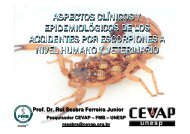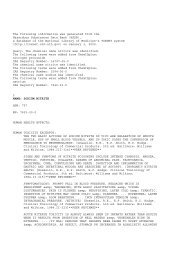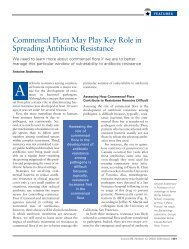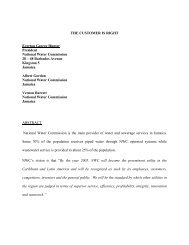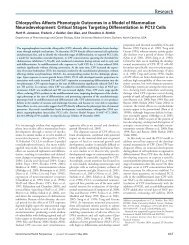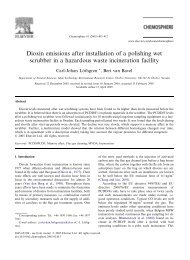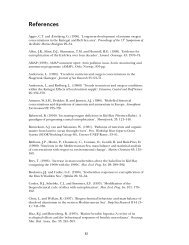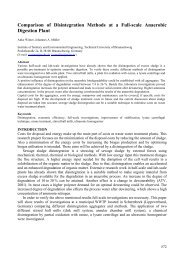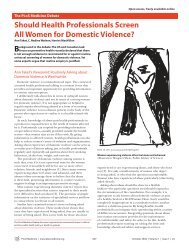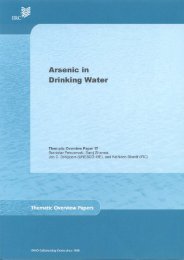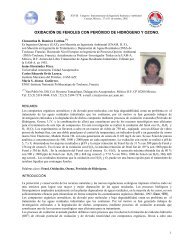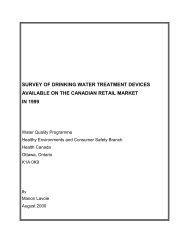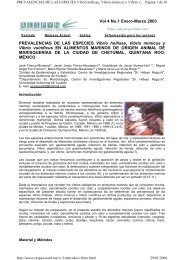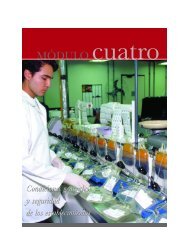TOXICOLOGICAL PROFILE FOR BARIUM AND COMPOUNDS ...
TOXICOLOGICAL PROFILE FOR BARIUM AND COMPOUNDS ...
TOXICOLOGICAL PROFILE FOR BARIUM AND COMPOUNDS ...
Create successful ePaper yourself
Turn your PDF publications into a flip-book with our unique Google optimized e-Paper software.
4<br />
1. PUBLIC HEALTH STATEMENT<br />
irritation, minor changes in blood, muscle weakness, changes in nerve<br />
reflexes, swelling of the brain, and damage to the liver, kidney, heart, and<br />
spleen. One study showed that people who drank water containing as much as 10<br />
ppm of barium for 4 weeks did not have increased blood pressure or abnormal<br />
heart rhythms. We have no reliable information about the possible health<br />
effects in humans who are exposed to barium by breathing or by direct skin<br />
contact. However, many of the health effects might be similar to those seen<br />
after eating or drinking barium. We have no information about the ability of<br />
barium to cause birth defects or affect reproduction in humans. Barium has<br />
not been shown to cause cancer in humans.<br />
The health effects of barium have been studied more often in<br />
experimental animals than in humans. Rats that ate or drank barium over short<br />
periods had build-up of fluid in the trachea (windpipe), swelling and<br />
irritation of the intestines, changes in organ weights, decreased body weight,<br />
and increased numbers of deaths. Rats that ate or drank barium over long<br />
periods had increased blood pressure and changes in the function and chemistry<br />
of the heart. Mice that ate or drank barium over a long period had a shorter<br />
life span. We have no reliable information about the health effects in<br />
experimental animals that are exposed to barium by breathing or by direct skin<br />
contact. We also have no reliable information to tell whether barium causes<br />
cancer or birth defects in experimental animals.<br />
The Department of Health and Human Services, the International Agency<br />
for Research on Cancer, and EPA have not classified barium as to its<br />
carcinogenicity.<br />
More information on the health effects of barium can be found in<br />
Chapter 2.<br />
1.5 IS THERE A MEDICAL TEST TO DETERMINE WHETHER I HAVE BEEN EXPOSED TO <strong>BARIUM</strong>?<br />
There is no routine medical test to determine whether you have been<br />
exposed to barium. Doctors can measure barium in body tissues and fluids,<br />
such as blood, bones, urine, and feces, using very complex instruments. This<br />
is normally done only for cases of severe barium poisoning and for medical<br />
research. More information on testing for barium exposure is found in<br />
Chapters 2 and 6.<br />
1.6 WHAT RECOMMENDATIONS HAS THE FEDERAL GOVERNMENT MADE TO PROTECT HUMAN HEALTH?<br />
To protect individuals from the possible harmful health effects of<br />
barium, the federal government regulates the amount of barium in the<br />
environment. EPA estimates that for an adult of average weight, exposure to<br />
1.5 ppm of barium in water each day for a lifetime (70 years) is unlikely to<br />
result in harmful health effects. For a long-term but less than lifetime



